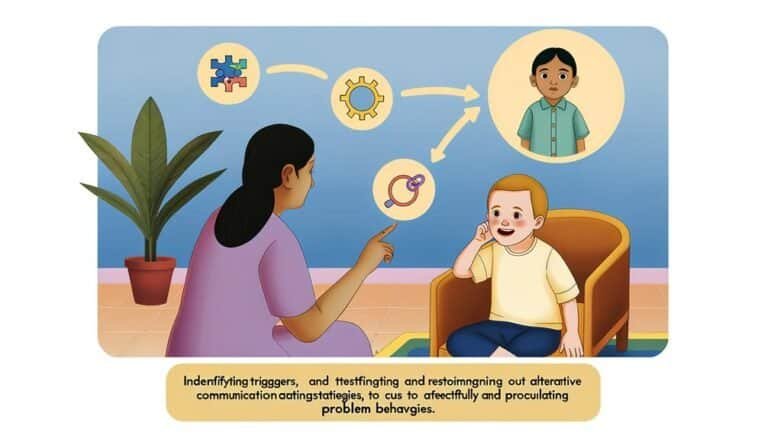7 Unintentional Things You’re Doing to Make People Ignore You
Have you ever wondered why it feels like people are ignoring you, even when you’re trying to connect with them? Sometimes, our behaviors and actions unintentionally push others away, causing them to ignore us. Understanding these unintentional ignoring behaviors and learning how to avoid them can help improve your relationships and interactions with others.
According to The Gottman Institute, bids are the building blocks of healthy relationships, and ignoring them can lead to emotional disengagement and unhappiness. Busting bids by being distracted and not giving attention to loved ones can create detachment and distance in relationships.
Key Takeaways:
- Avoiding unintentional ignoring behaviors is crucial for maintaining healthy relationships.
- Recognize the importance of bids in fostering stronger connections.
- Turn towards loved ones and acknowledge their bids to show you value the relationship.
- Address stonewalling behavior when encountered and seek reconciliation if needed.
- Improve communication styles to strengthen emotional connections and cultivate healthier relationships.
Understanding Bids in Relationships
Bids are the meaningful daily endeavors when you invite your partner into your world and ask to enter theirs. They are crucial for building and maintaining healthy relationships. By acknowledging and responding to bids, you enhance emotional connection and overall satisfaction in the relationship.
However, ignoring bids can have detrimental effects on the relationship. It can lead to emotional disengagement, loneliness, and dissatisfaction. When you consistently ignore your partner’s bids, it creates a sense of detachment and distance. Over time, this can erode the foundation of trust and intimacy in the relationship.
Imagine your partner shares something exciting or important with you, but you’re distracted and fail to give them the attention they deserve. By not actively engaging in their bid for connection, you unintentionally communicate disinterest or disapproval. This can cause your partner to feel unheard, unimportant, and ultimately disengaged from the relationship.
To further illustrate the importance of bids, consider the following table:
| Effects of Ignoring Bids in Relationships |
|---|
| Emotional Disengagement |
| Loneliness |
| Relationship Dissatisfaction |
| Detachment |
As you can see, ignoring bids can have far-reaching consequences, compromising the emotional connection and overall well-being of the relationship.
An image illustrating a couple engaged in a meaningful conversation, emphasizing the importance of healthy relationships.
The Dangers of Ignoring Bids
Ignoring bids in a relationship can have serious consequences, leading to emotional disengagement, loneliness, and overall relationship dissatisfaction. When one partner consistently ignores the bids made by the other, it creates a sense of being ignored or rejected, which can erode the foundation of trust and connection.
Emotional disengagement is a common result of ignoring bids. When bids for attention, affection, or communication are consistently dismissed, it creates a sense of emotional distance between partners. This disengagement can leave both individuals feeling disconnected and unfulfilled in the relationship.
Loneliness is another significant consequence of ignoring bids. When bids for connection are ignored, partners can feel isolated and alone, even when physically present with their loved one. Loneliness can breed resentment and further contribute to relationship dissatisfaction.
Overall, ignoring bids in a relationship leads to general relationship dissatisfaction. When one partner feels ignored or rejected, it can create a breakdown in communication, intimacy, and overall relationship quality. Partners may begin to question the value and significance of the relationship, and this dissatisfaction can have far-reaching effects on the partnership.
“The absence of bids in a relationship can cause partners to feel ignored or rejected, leading to a breakdown in communication and connection.”
Effects of Ignoring Bids:
- Emotional disengagement
- Loneliness
- Relationship dissatisfaction
It is crucial for couples to recognize the dangers of ignoring bids in order to foster a healthy and fulfilling relationship. In the next section, we will explore the importance of turning towards loved ones and acknowledging their bids, which helps to strengthen the bond and connection between partners.
The Importance of Turning Towards Loved Ones
Turning towards loved ones and acknowledging their bids is crucial for creating a strong connection in relationships. It shows that you value and prioritize the relationship, fostering trust and intimacy.
When you turn towards your loved ones, you are actively engaging with them, expressing interest, and being present in the moment. This means listening attentively when they speak, responding with empathy, and being responsive to their needs and desires.
In a study conducted by researchers John and Julie Gottman, they found that couples who consistently turned towards each other had a higher level of relationship satisfaction compared to those who turned away or ignored their partner’s bids.
The act of turning towards your loved ones not only creates a deeper sense of connection but also strengthens the emotional bond between you. It fosters a sense of security and reassurance, as your partner feels seen, heard, and understood.
“When you turn towards your loved ones, you are actively engaging with them, expressing interest, and being present in the moment.”
Turning towards loved ones also helps in resolving conflicts and building effective communication. By actively engaging in conversations and addressing their concerns, you create an environment where both parties feel safe to express their feelings and needs.
When you turn towards your loved ones, you are showing them that they matter to you and that their opinions and emotions are valued. This not only deepens the connection between you but also lays the foundation for a healthier and more fulfilling relationship.
Benefits of Turning Towards Loved Ones in Relationships
By prioritizing the act of turning towards your loved ones, you can experience a range of benefits in your relationship:
- Enhanced emotional connection and intimacy
- Improved trust and security
- Effective conflict resolution
- Increased relationship satisfaction
When you consistently turn towards your loved ones, you create a positive cycle of connection and reciprocity. It encourages your partner to do the same, fostering a mutually supportive and fulfilling relationship.
Turning Towards vs. Turning Away or Against
Turning towards loved ones requires a conscious effort to be present and engaged. It involves actively choosing to respond to their bids for attention, support, or connection.
On the other hand, turning away or against involves dismissing, ignoring, or rejecting their bids. This behavior creates distance, erodes trust, and can lead to feelings of resentment and loneliness in the relationship.
To illustrate the importance of turning towards loved ones, let’s compare the effects of different responses to bids:
| Response to Bids | Effect on Relationship |
|---|---|
| Turning Towards | Strengthens connection and builds trust |
| Turning Away | Creates distance and feelings of neglect |
| Turning Against | Causes conflict and emotional disengagement |
As you can see, actively turning towards your loved ones is essential for nurturing your relationship and maintaining a strong emotional bond.
Recognizing and Avoiding Stonewalling
Stonewalling is a common behavior that can have detrimental effects on communication and conflict resolution within relationships. It involves disengaging from a conversation or relationship, effectively ignoring the other person’s attempts to connect or address conflicts. Recognizing the signs of stonewalling and finding alternative ways to address conflict can greatly improve relationships and promote healthier communication.
Stonewalling can manifest in various ways, such as shutting down emotionally, giving the silent treatment, or refusing to engage in a constructive conversation. It creates a barrier between partners, inhibiting the resolution of conflicts and the nurturing of a strong emotional connection.
When confronted with stonewalling, it is essential to understand that it often stems from a place of emotional distress and an inability to effectively communicate. Instead of reciprocating with defensive or negative responses, adopting a compassionate and empathetic approach can positively impact the situation.
Recognizing Signs of Stonewalling:
- Withdrawal: The individual physically or emotionally withdraws from the conversation or relationship.
- Avoidance: They actively avoid confrontation and refuse to engage in problem-solving discussions.
- Ignoring: The person disregards or dismisses the other’s attempts to communicate or address conflict.
To avoid stonewalling and foster healthier communication, it is important to implement effective conflict resolution strategies. One such strategy is taking breaks during intense discussions to calm emotions and regain clarity. This allows both individuals to approach the conversation with a more open and understanding mindset.
Furthermore, actively listening to your partner’s concerns and expressing empathy can create a safe space for open dialogue. Validating their emotions and experiences can help alleviate tension and facilitate conflict resolution.
Remember, effective communication involves both speaking and listening. By approaching conflicts with patience, understanding, and a willingness to find common ground, you can overcome stonewalling and enhance the quality of your relationship.
Take a moment to reflect on the following table, which illustrates the detrimental effects of stonewalling compared to effective communication and conflict resolution:
| Stonewalling | Effective Communication and Conflict Resolution |
|---|---|
| Creates emotional distance and disconnection | Fosters emotional intimacy and connection |
| Strains the relationship and erodes trust | Builds trust and strengthens the relationship |
| Leads to unresolved conflicts and resentment | Promotes conflict resolution and mutual understanding |
By recognizing stonewalling and actively working towards healthier communication and conflict resolution, you can create a more fulfilling and harmonious relationship.
Strategies for Overcoming Ignoring Behaviors
To overcome unintentional ignoring behaviors, it is important to practice healthy communication and conflict resolution skills. By implementing these strategies, you can improve your relationships and foster stronger connections with your loved ones.
1. Actively Listen
Actively listening is a crucial component of healthy communication. It involves giving your full attention to the speaker, maintaining eye contact, and acknowledging their thoughts and feelings. By actively listening, you can ensure that you are not inadvertently ignoring their bids for connection.
2. Express Empathy
Expressing empathy is an essential aspect of addressing unintentional ignoring behaviors. When someone expresses their needs or concerns, make an effort to understand their perspective and validate their emotions. Show empathy by acknowledging their feelings and providing support without judgment.
3. Be Present in Conversations
In a fast-paced world, it can be easy to become distracted or preoccupied during conversations. However, being present and fully engaged in the moment is crucial for overcoming ignoring behaviors. Put away distractions, such as phones or screens, and actively participate in conversations to strengthen your connection with others.
4. Take Responsibility for Your Actions
Recognizing and taking responsibility for your own actions is an important step towards overcoming unintentional ignoring behaviors. Reflect on how your behaviors may impact others and make a conscious effort to be more attentive and responsive. Accepting accountability for your actions can lead to positive changes in your relationships.
5. Seek Feedback from Others
Seeking feedback from others can provide valuable insights into your communication style and how it may inadvertently contribute to ignoring behaviors. Ask trusted individuals for their observations and suggestions on how you can improve your communication skills. Their perspectives can help you address any blind spots and enhance your relationships.
| Strategies for Overcoming Ignoring Behaviors | Benefits |
|---|---|
| Actively Listen | -Enhances understanding and connection -Promotes open and honest communication |
| Express Empathy | -Validates emotions and builds trust -Strengthens emotional connection |
| Be Present in Conversations | -Creates a sense of importance and value -Improves overall communication |
| Take Responsibility for Your Actions | -Fosters personal growth and self-awareness -Builds accountability and trust |
| Seek Feedback from Others | -Provides valuable insights and perspectives -Facilitates self-improvement and relationship enhancement |
By implementing these strategies and having open and honest communication, you can overcome unintentional ignoring behaviors and cultivate healthier relationships. Remember, healthy communication and conflict resolution skills are essential for fostering connection, understanding, and growth with your loved ones.
Addressing Stonewalling in Relationships
When encountering intentional stonewalling in a relationship, it is essential to address the issue directly and openly. Ignoring this behavior can further deteriorate the bond and emotional connection between partners. To address stonewalling effectively:
Discuss the impact of stonewalling
Initiate a conversation with your partner about the impact their stonewalling has on the relationship. Express your feelings and concerns in a non-confrontational manner to encourage open communication.
Set boundaries
Establish clear boundaries regarding stonewalling behavior. Clearly communicate the consequences of continued stonewalling and emphasize the importance of mutual respect and healthy communication in the relationship.
Seek reconciliation
Work together with your partner to find ways to reconcile and rebuild trust. This may involve seeking couples therapy or counseling to address underlying issues and develop effective communication and conflict resolution strategies.
However, it’s important to note that intentional stonewalling can be a form of emotional abuse. If the stonewalling persists or escalates to emotional abuse, professional intervention may be necessary to ensure the safety and well-being of all individuals involved.
Addressing stonewalling in relationships is crucial for fostering mutual understanding, resolving conflicts, and rebuilding emotional connections. By acknowledging the issue, setting boundaries, and seeking reconciliation, couples can work towards healthier and more fulfilling relationships.
Improving Communication Styles
Effective communication is the cornerstone of healthy relationships. Understanding and adapting to different communication styles can help you avoid unintentionally ignoring behaviors and promote better connection and conflict resolution. By recognizing the differences in communication preferences, employing structured conversations, and stepping out of your comfort zone, you can cultivate stronger emotional connections and build healthier relationships.
Recognizing Different Communication Styles
Each person has their own unique way of expressing themselves and receiving information. Some individuals may prefer direct and assertive communication, while others may lean towards a more indirect and diplomatic approach. By being mindful of these differences, you can tailor your communication style to match the preferences of your loved ones, fostering understanding and avoiding misunderstandings.
Employing Structured Conversations
Structured conversations provide a framework for effective communication. By establishing ground rules, such as taking turns to speak, actively listening, and avoiding interrupting, you create a safe space for open and honest dialogue. This allows each person to express their thoughts, feelings, and needs without fear of judgment or interruption, leading to better conflict resolution and a deeper emotional connection.
Stepping Out of Your Comfort Zone
Growth happens when you step outside of your comfort zone. This principle also applies to communication styles. Being open to new ways of expressing yourself and considering alternative approaches can help you bridge communication gaps and foster understanding. It’s important to actively listen and validate the perspectives of others, even if they differ from your own. By embracing diverse communication styles, you can create a more inclusive and harmonious relationship.
Remember, improving communication styles takes time and effort, but the rewards are worth it. When you prioritize effective communication, you enhance your emotional connection and resolve conflicts more efficiently. Take the initiative to better understand and adapt to different communication styles, and watch your relationships thrive.
| Tips | Benefits |
|---|---|
| Recognize and respect different communication styles | – Enhance understanding and avoid misunderstandings – Foster empathy and mutual respect |
| Establish ground rules for structured conversations | – Create a safe space for open dialogue – Promote active listening and conflict resolution |
| Embrace diversity and step out of your comfort zone | – Foster inclusivity and acceptance – Enhance adaptability and growth |
Seeking Support and Therapy
If unintentional ignoring behaviors persist or if intentional stonewalling persists in a relationship, seeking support from a therapist or relationship counselor can be beneficial. Therapy can provide guidance, tools, and techniques to address underlying issues and improve the overall dynamics of the relationship.
Relationship counseling offers a safe space for both partners to express their concerns and work towards finding effective solutions. A therapist can help to identify patterns of behavior, communication pitfalls, and unresolved issues that may contribute to the ignoring behaviors or stonewalling.
Benefits of Seeking Support and Therapy:
- Gain insights into your own behavior and emotions
- Learn effective communication skills
- Address underlying issues and conflicts
- Improve emotional connection and intimacy
- Enhance conflict resolution strategies
Through therapy, individuals can develop a deeper understanding of themselves and their partner, ultimately leading to improved relationship satisfaction. It provides a structured and supportive environment for exploring emotions, enhancing self-awareness, and fostering growth.
“Therapy can be a transformative process that allows couples to break free from negative relationship patterns and develop healthier ways of relating to one another.” – Dr. Sarah Johnson, Licensed Marriage and Family Therapist
With the guidance of a therapist, couples can work together to overcome the challenges that contribute to unintentional ignoring behaviors or intentional stonewalling. They can learn new strategies for effective communication, conflict resolution, and building a stronger emotional bond.
| Benefits of Seeking Support and Therapy | Examples |
|---|---|
| Gain insights into your own behavior and emotions | Understanding how your actions may unintentionally contribute to ignoring behaviors |
| Learn effective communication skills | Practicing active listening and assertive communication techniques |
| Address underlying issues and conflicts | Exploring unresolved emotional wounds or past traumas |
| Improve emotional connection and intimacy | Building trust and vulnerability in the relationship |
| Enhance conflict resolution strategies | Learning to navigate disagreements in a healthy and constructive manner |
Conclusion
Avoiding unintentional ignoring behaviors is crucial for maintaining healthy relationships. By recognizing the importance of bids and actively turning towards loved ones, you can foster stronger connections and improve communication. Addressing stonewalling and seeking support through therapy or counseling can also be valuable in navigating and resolving potential ignoring behaviors in your relationships. Remember, healthy relationships require effort and a commitment to open communication and mutual understanding.
By avoiding unintentional ignoring behaviors, you can create a foundation of trust and emotional connection with your loved ones. It’s essential to be present in conversations, actively listen, and express empathy to show that you value and prioritize your relationships. Additionally, recognizing and addressing stonewalling behavior is important for resolving conflicts and preventing emotional disengagement.
Seeking support through therapy or counseling can provide guidance and tools to help you address underlying issues, improve communication styles, and strengthen your relationships. Remember, it’s never too late to seek help and work towards building healthier and more fulfilling connections with the people you care about. Investing time and effort in avoiding unintentional ignoring behaviors can lead to happier and more satisfying relationships in the long run.






